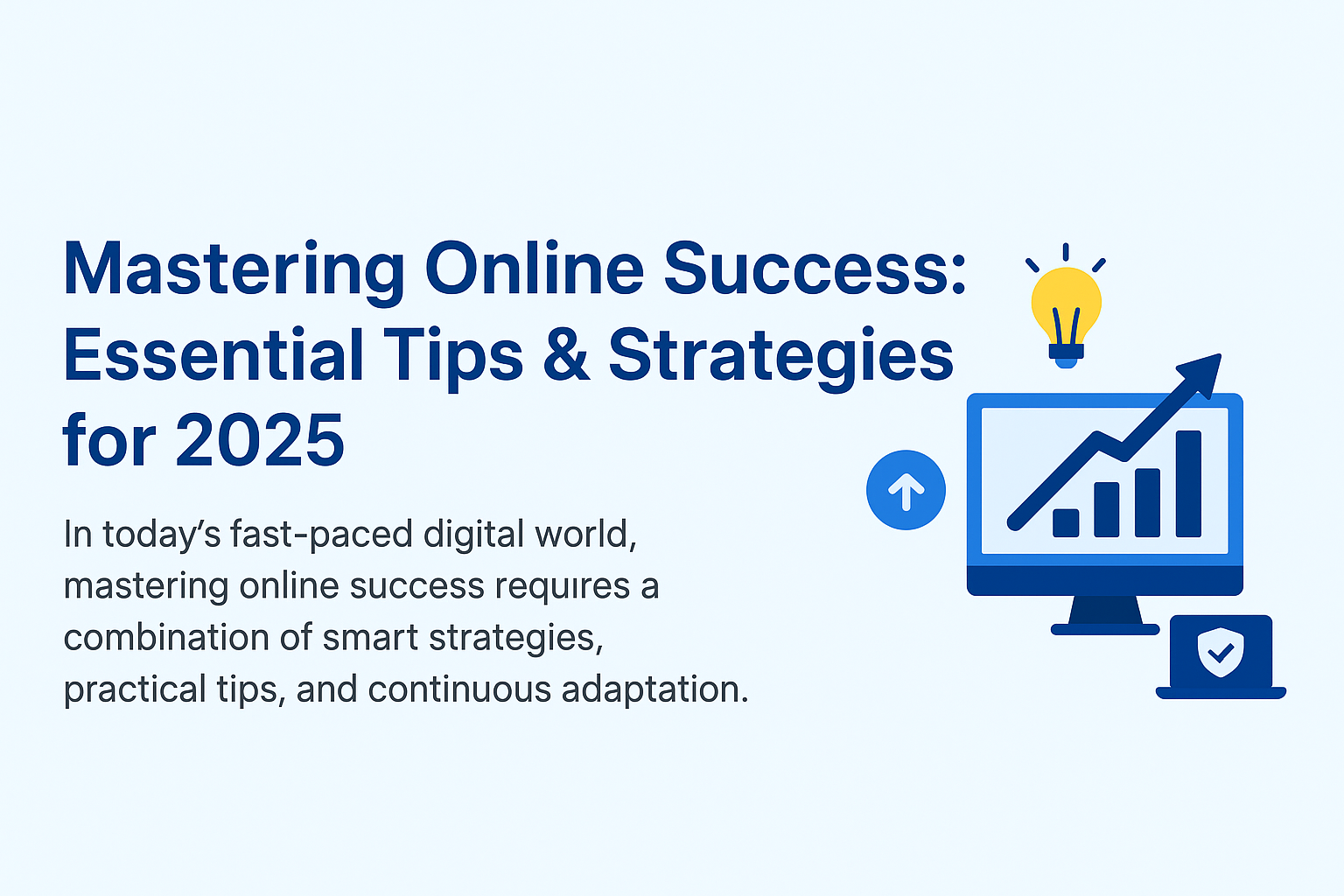
- introduction
- 1. Define Clear Goals and Objectives
- 2. Understand Your Audience
- 3. Optimize Content for SEO
- 4. Leverage Social Media Strategically
- 5. Embrace Email Marketing
- 6. Invest in Continuous Learning
- 7. Monitor Analytics and Adjust Strategies
- 8. Prioritize User Experience (UX)
- 9. Diversify Your Content Formats
- 10. Stay Consistent and Patient
introduction
In today’s fast-paced digital world, mastering online success requires a combination of smart strategies, practical tips, and continuous adaptation. Whether you are a blogger, entrepreneur, or digital marketer, implementing effective techniques can dramatically improve your productivity, engagement, and overall results. This article provides actionable insights to help you stay ahead of the curve in 2025 and beyond.
1. Define Clear Goals and Objectives
Before diving into any online endeavor, it is crucial to set clear and measurable goals. Without direction, efforts can easily become scattered. Start by asking yourself:
- What do I want to achieve online?
- Who is my target audience?
- What resources and tools do I need to succeed?
Use frameworks like SMART goals (Specific, Measurable, Achievable, Relevant, Time-bound) to keep your objectives focused and trackable. Clear goals allow you to evaluate performance and make necessary adjustments quickly.
2. Understand Your Audience
One of the most effective strategies is knowing your audience inside out. Research your target demographic’s interests, pain points, and online behavior. Tools like Google Analytics, Facebook Audience Insights, and surveys can provide valuable data.
Key tips for audience understanding:
- Segment your audience based on interests or needs.
- Tailor your content to solve specific problems.
- Monitor engagement metrics to refine your approach.
3. Optimize Content for SEO
Search Engine Optimization (SEO) is the backbone of online visibility. High-quality content is essential, but ensuring it is discoverable is equally important.
Practical tips:
- Use relevant keywords in titles, headings, and throughout the content naturally.
- Optimize meta titles and descriptions for each page.
- Use internal linking to keep visitors engaged and improve site structure.
- Include images with descriptive ALT tags for better search rankings.
Consistency in SEO practices can significantly boost organic traffic and improve long-term results.
4. Leverage Social Media Strategically
Social media remains a powerful tool to expand your reach and interact with your audience. However, the key is strategic use rather than posting randomly.
Strategies include:
- Focus on platforms where your audience is most active.
- Create a content calendar to maintain consistency.
- Engage actively by responding to comments and messages.
- Analyze performance to know which content works best.
Remember, quality engagement often matters more than quantity.
5. Embrace Email Marketing
Despite the rise of social media, email marketing remains one of the most effective digital strategies. Building an email list allows you to connect directly with your audience and nurture long-term relationships.
Tips for effective email campaigns:
- Offer valuable lead magnets like eBooks or exclusive guides.
- Segment your list to send personalized messages.
- Use attention-grabbing subject lines to improve open rates.
- Track metrics such as open rate, click-through rate, and conversions.
6. Invest in Continuous Learning
The online landscape is constantly evolving. To stay competitive, you must invest in continuous learning and skill development.
- Follow industry blogs and influencers.
- Attend webinars, workshops, and online courses.
- Test new tools and technologies to see what improves efficiency.
Being adaptable and knowledgeable will give you an edge over competitors.
7. Monitor Analytics and Adjust Strategies
Without measurement, even the best strategies may fail. Use analytics tools like Google Analytics, Search Console, and social media insights to monitor performance.
Key metrics to track:
- Traffic sources and audience behavior.
- Conversion rates and engagement metrics.
- Content performance and keyword rankings.
Regular analysis allows you to identify successful tactics, correct mistakes, and optimize your efforts for maximum impact.
8. Prioritize User Experience (UX)
A positive user experience is critical for retaining visitors and encouraging repeat engagement.
- Ensure fast loading times using optimized images and caching.
- Make your website mobile-friendly, as most users browse via smartphones.
- Simplify navigation and site structure to make information easy to find.
- Use clear calls-to-action (CTAs) to guide user behavior.
Remember, happy users are more likely to share your content and return to your site.
9. Diversify Your Content Formats
Relying solely on blog posts can limit your reach. Diversify your content to appeal to different audience preferences:
- Videos and tutorials for visual learners.
- Infographics to summarize complex ideas.
- Podcasts for audience engagement on the go.
- Case studies and success stories to build credibility.
Offering a variety of content keeps your audience engaged and positions you as an authoritative source.
10. Stay Consistent and Patient
Finally, success in the online world does not happen overnight. Consistency, patience, and persistence are key.
- Publish content regularly according to a schedule.
- Review and update older posts to maintain relevance.
- Celebrate small wins and learn from setbacks.
Persistence pays off, especially in building authority, trust, and a loyal audience over time.
Conclusion
Mastering online success is a combination of planning, strategic execution, and continuous improvement. By setting clear goals, understanding your audience, optimizing content, leveraging social media, and embracing analytics, you can create a strong foundation for long-term growth. Remember, the online landscape is dynamic, but with the right tips and strategies, your digital presence can thrive in 2025 and beyond.




